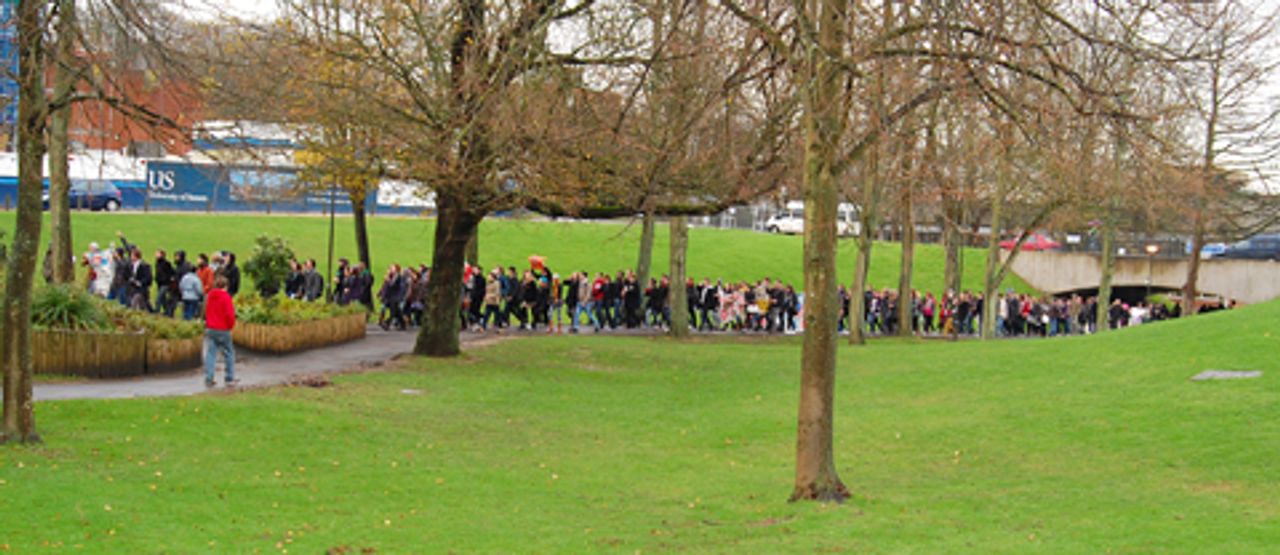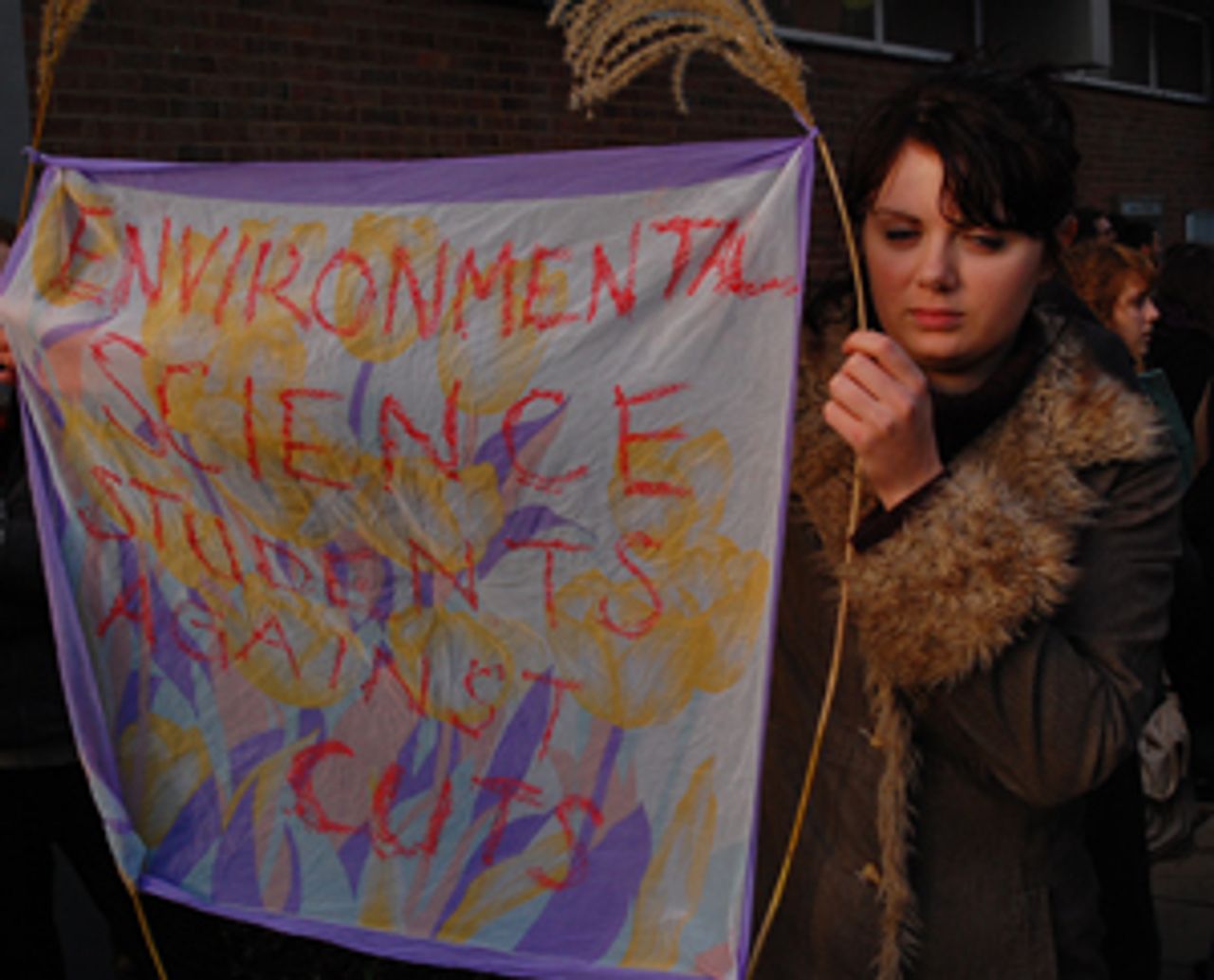 Last Thursday’s protest at the University of Sussex
Last Thursday’s protest at the University of SussexUp to 300 students and staff protested last Thursday against proposed cuts at the University of Sussex, Brighton, England. Protesters marched across the campus to a rally outside a meeting of the University of Sussex’s management body. Following the rally, most of the protesters entered Bramber House, where the Senate meeting was being held. The university administration then called the police. The demonstrators left the building, and mounted a smaller demonstration outside.
This was the second rally since last week’s announcement by Vice Chancellor Professor Michael Farthing that 115 jobs were to be axed, and academic and support services slashed, in a bid to cut £5 million for 2010-11 from the university’s £160 million budget. This follows a reduction of £3 million for 2009-10. Farthing himself earns £227,000 annually and the combined annual salaries of the top 20 managers at the university exceed £2.6 million.
Under the plan, redundancies will be made in the Schools of Engineering and Design, Informatics, Life Sciences, the Centre for Continuing Education, and English and History. Life Sciences will be particularly hard hit, with 24 jobs cut from Biology, Environmental Science, Chemistry and Biochemistry. Further cuts have yet to be announced to technical support services in the department.
Some of these redundancies will be compulsory. The decision on redundancies will be made in March 2010, and will take effect in July. A second round of cuts will be announced in March.
Some parts of the English and History curricula will be cut. The university will withdraw from all research and research-led teaching in pre-1700 English social history. The proposed five redundancies in the English department will be accompanied by a withdrawal from parts of that curriculum.
The university is also proposing cuts to student support. Nine jobs will be lost in IT support. Management is also looking to axe 11 of the 16 student advisers, with a reduction in one-to-one support. The UNISEX programme, which collaborates with the National Health Service locally to provide help with drug and sexual issues at Sussex and Brighton universities, will be scrapped. It is also proposed to reduce the hours of library and information staff, and porters.
The university is also intending to increase its charges. When the government lifts its cap on student fees, the university has stated that it will be “seeking higher level fees,” in English particularly. It is raising car-park charges further: many students and staff already park off-campus because of the cost. Charges will be raised at the university crèche. The university is considering alternative off-campus childcare provision, and has warned that it will consider closing the provision.
Some changes will affect mature students in particular. The university is axing seven posts in the Centre for Community Engagement, which runs part-time courses for those returning to education.
Farthing’s proposals are based on attracting another 1,170 students to the university next year, and each School becoming financially self-supporting. Only four Schools have shown signs of growth, and will therefore see increased funding. One is the newly-formed School of Law, Politics and Sociology, established at the beginning of this year after a controversial reorganisation was pushed through by management.
The student newspaper the Badger has noted that the new head of this School, Professor Stephen Shute, was previously instrumental in closing Birmingham University’s successful Sociology department. Shute chaired a review body to which no staff or students were invited. The review board ruled in favour of closure. There have been no clear explanations given for the decision, with Birmingham University variously citing finance, research performance, and student recruitment. Given that Sussex last year closed its Linguistics department following a similar review, there is understandable concern that Shute’s appointment was a step towards further cuts.
Anger is growing at the scale of the proposed cuts. This was reflected in the high turnout at the second rally, which heard speakers from a number of the threatened schools and departments as well as the Student Union (USSU). School of English students circulated a leaflet noting that “management’s formula: ‘fewer staff, more students’ will be detrimental to the quality of teaching’.” Education, they wrote, “should not be left at the mercy of market forces or be turned into an instrument of business.”
Such comments are significant, as was the joint demonstration by staff and students. However, none of the speakers was able to draw any wider lessons from the proposals. Resistance to the cuts was presented entirely on a local basis, with protesters chanting: “Sussex united will never be defeated.”
This has been the line advanced by USSU, which faces a 5 percent cut in its funding from the university. USSU President Tom Wills—the only student representative involved in the management negotiations—issued a statement last week in which he insisted that the first step would be “defeating these proposals locally.” Then, by working with other student unions around the country, it will be possible to “put real pressure on government to increase investment in universities.”
For all that Wills’ statement opposes “a university funded … by corporate research contracts,” and does refer to broader attacks on public services, his criticism is focused on what he describes as “bad management.” USSU’s only strategy is to invoke “measures to put pressure on University management.”
Several speakers at the rally suggested the problem was the university’s failure to negotiate over the cuts. The Stop the Cuts campaign at the university demands that management “makes no compulsory redundancies and resists student fees and cuts in higher education spending.” It makes no comment on voluntary redundancies or worsening working conditions for students or staff.
Accordingly, several speakers looked to the lecturers’ union, the University College Union (UCU), as the appropriate negotiating body to take forward the fight. There were pledges of student support for any UCU action.
Illusions in the UCU have been sown by ex-radical groups like the Socialist Workers Party (SWP), and the Socialist Party (SP). The SP circulated a leaflet stating “The Trade Unions must take coordinated action including strike action by all sections of staff.” The English students’ leaflet pledged their unequivocal support for strike action “should the UCU deem it necessary to take such action.”
The University of Sussex UCU has voted unanimously to “resist all redundancies,” particularly compulsory redundancies, and to authorise a ballot for industrial action including strike action and action short of a strike “if, as and when, it becomes appropriate.”
Such action, given the history of the UCU, is unlikely to be effective. Cuts are currently taking place throughout the higher and further education sectors. Similar measures are being imposed globally.
The UCU has played a politically criminal role in isolating and betraying teaching staff facing cuts. In the face of a wholesale government offensive against public education in Britain, the unions continue to present the onslaught on jobs as the product of incompetent or irresponsible individuals. As the Sussex UCU vote of no confidence put it, redundancies would be “the sorry outcome of mismanagement, poor governance and an almost complete lack of consultation … which, devoid of imagination or capability, initiated sequence after sequence of reorganisations which created disruption and distress with … no long-term benefit.”
In practice such an attitude will become an apology for collaborating in negotiating the assault on education. A recent joint statement by the UCU, National Union of Students (NUS), and other unions involved in Higher Education, made no mention of the Labour government’s role in education cuts. It appealed instead to “a partnership between unions and employers” to agree job security.
International Students for Social Equality (ISSE) supporters distributed a leaflet to protesters at the rally that raised both the international character of the assault on education, and also the role of the UCU. The leaflets called for the mobilisation of a political movement uniting those employed in education with students and broader layers of the working class, and a political break from the UCU apparatus in the fight against the Labour government’s cuts, on the basis of a socialist programme.
Several students and staff spoke to the ISSE.
 Alice James
Alice JamesAlice James studies Environmental Science. Her course is marked for closure under the proposals. The university cites low student participation rates, but there are allegations that the university has deliberately not advertised the course to ensure low enrolments. One member of staff also suggested that figures were being falsified to justify closing “unviable” departments.
Despite its current low participation, Alice said, the course is academically respected for its research. One Chemistry course concerning pollution—the only one of its kind in Britain—is to be axed, emphasising how some areas of study are being demolished in the interests of profit.
Management, she said, is not listening to students or the unions. The government is facing a “dire” financial situation, but “the deficit is being put into the wrong places.” The government is “making cuts from the bottom up, and low-skilled workers and students are being forced to pay.”
One student opposed any cuts. She said that management claimed to be cutting the parts of education that are not financially viable, commenting, “But university is not supposed to be financially viable: it is supposed to be about education.”
That is entirely correct. But such a defence of education requires a fight for a socialist programme. The International Students for Social Equality is the only organisation on the campus at Sussex or any other university that is fighting for such a programme. Education and the development of scientific or artistic culture cannot be left to the marketplace.
